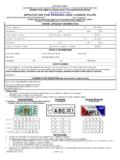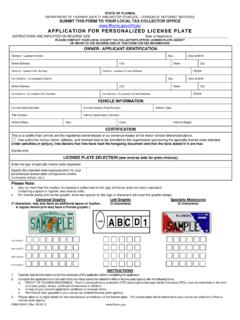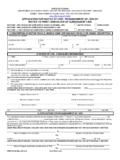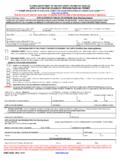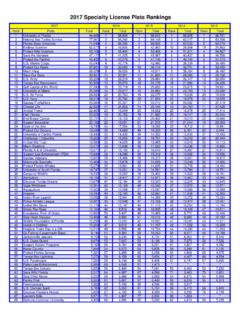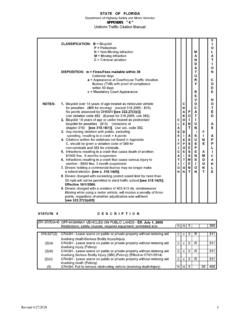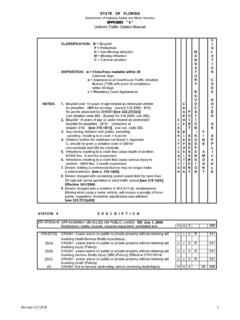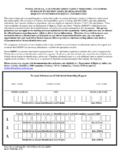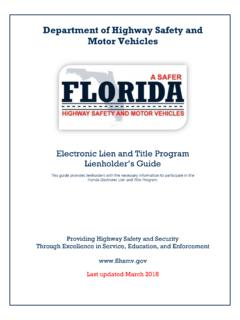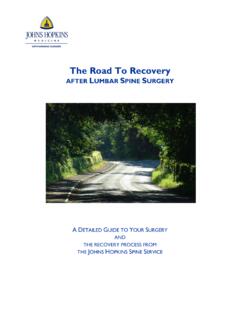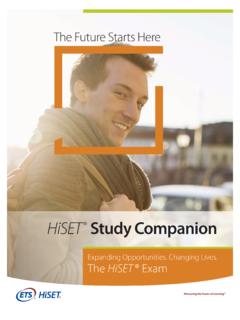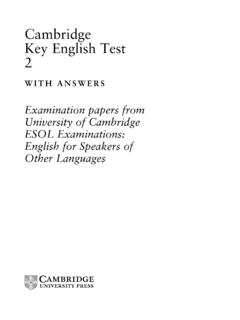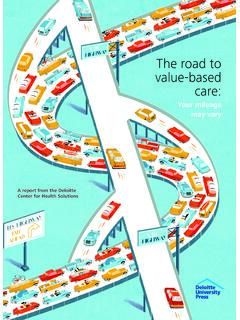Transcription of Test Your Knowledge - Florida Department of Highway …
1 Test your Knowledge Refer to the Official Florida Class E Driver License Handbook to answer the questions below. Chapter 1. 1a. In your vehicle, what should you adjust before you start your engine? 1b. What are the equipment requirements for windshields and side windows? 1c What are bumper height requirements? Are they the same for every vehicle? 1d. What must you do if hauling a load of material which could fall or blow onto the roadway? 1e. When a projected load extends more than 4 feet from the vehicle, what must you use to clearly mark it in the day- time? At night? Chapter 2. 2a. Why is drowsy driving dangerous? 2b. What should you do if another driver is threatening you or intentionally driving dangerously around you? 2c. What are the three main categories of distracted driving? 2d. Why is texting one of the most dangerous of distracted driving behaviors? 2e. Can anyone drink and drive safely?
2 2f. Both your judgment and vision are affected after drinking alcohol. Which is affected first? Chapter 3. 3a. What can happen to you if you are in a crash and not wearing a seat belt? 3b. What age are children required to be in a car seat? In a car seat or booster seat? 3c. If a law enforcement officer stops a vehicle and a front seat passenger (under 18 years old) is not wearing a safety belt, who will be charged with the seat belt violation? Chapter 4. 4a. What does a single broken white line on the Highway mean? 4b. What does a double solid yellow line in the center of the Highway mean? A double solid white line? 4c. What does a solid yellow line to the right of the center line of the Highway mean? 4d. What do the colors of traffic signs indicate (red, orange, yellow, etc.)? 4e. When more than one vehicle approaches a four-way stop sign, which one moves first? 4f. What does a red traffic light mean?
3 What does a flashing red traffic light mean? 4g. After a full stop at a red traffic light when may a driver turn right? 4h. What does a green arrow showing at the same time as a red traffic light mean you can do? 4i. What does a flashing yellow light mean? 4j. If you are approaching a railroad crossing that does not have gates or lights and you see a train coming, what should you do? 2017 Florida Department of Highway Safety and Motor Vehicles Chapter 5. 5a. What happens to the force of impact when you double your speed? Triple your speed? 5b. Unless otherwise posted, what is the speed limit for cars in a residential area? 5c. What is the maximum speed limit on an interstate Highway ? 5d. Can you be issued a ticket for driving too slowly? 5e. What are the steps for making a smooth stop? 5f. What is the arm signal for a left turn? Right turn? Slow or stop? 5g. How long (distance) should you signal before making a left or right turn?
4 5h. When can you use a three-point turn? Where should you never make a three-point turn? 5i. What is an open intersection? When must you yield right-of-way? 5j. When may you drive in the left lane of a road with two lanes? With four lanes? 5k. What does it mean if you see red reflectors on the lane lines facing you? What should you do? 5l. What is the recommended safe following distance? 5m. When should you increase your following distance? 5n. What are blind spots? 5o. How do you check your blind spots when you are preparing to change lanes or turn? 5p. Where is it unlawful to overtake and pass? 5q. Under what circumstances can you stop in the acceleration lane on an expressway? 5r. What should you do if you drive past your exit on an interstate Highway ? 5s. Where should you move your vehicle if you break down while driving on the Highway ? 5t. What is the farthest away you can park from a curb?
5 5u. If you have a manual transmission, what gear should you put the car in when parking downhill? Uphill? What if you have an automatic transmission? 5v. Where is parking prohibited? 5w. Which way should you turn your wheels when parking uphill along a curb? Which way should you turn them where there is not a curb? Which way should you turn them if parking downhill? Chapter 6. 6a. Are motorists required to stop or yield for pedestrians crossing the street? 6b. What must you do when you see a pedestrian with a white cane in the street ahead of you? 6c. What is the minimum distance a motorist must give when traveling next to a cyclist? 6d. As a motorist, what should you do when preparing to turn right on a roadway with a bike lane? 6e. When on the roadway, do motorcyclists and moped riders have the same rights and responsibilities as motor vehi- cle drivers? 6f. If you are driving a motor vehicle, are you allowed to share a lane with a motorcyclist?
6 6g. When a school bus is stopped to unload children on a Highway divided with a raised barrier, are vehicles traveling in the opposite direction required to stop? 6h. When a school bus stops to unload children, are vehicles traveling in the same direction required to stop? 6i. What must you do when children or school crossing guards are present in a crosswalk? 6j. What must you do if an emergency vehicle with activated lights and/or sirens is approaching you from behind? 6k. What does the Move Over law require you to do? 6l. What is a No Zone ? 2017 Florida Department of Highway Safety and Motor Vehicles Chapter 7. 7a. At what times must you use your headlights? 7b. At night, within how many feet of approaching a vehicle from the rear must you dim your bright headlights? 7c. Within how many feet of an oncoming vehicle should you dim your bright headlights? 7d. When driving in the rain, fog, or smoke in the daytime, what lights should you use?
7 7e. What should you do when driving on wet roads in the rain? Why? Chapter 8. 8a. What should you do if your right wheels go off the pavement while driving? 8b. What should you do if your tires begin to skid while driving? 8c. When emergency braking, what is the difference between conventional brakes and anti-lock brakes (ABS)? 8d. What should you do during a tire blow-out? 8e. What must you do if you are involved in a minor accident and your vehicle is blocking the flow of traffic? 8f. If you hit a parked car and are unable to find the owner, what should you do? 8g. What are the penalties for leaving the scene of an accident involving injury or death? Chapter 9. 9a. What are the requirements of the No-Fault law? 9b. If your license and registration are suspended for being in violation of the No-Fault law, what must you do to get them reinstated? 9c. What are the penalties if you are at fault in a crash and you are not insured in compliance with the Financial Respon- sibility Law?
8 9d. What are the time restrictions for a driver with a learner's license? 9e. What are the time restrictions for a licensed driver under age 17? Under age 18? 9f. When can you be charged with driving under the influence (DUI)? 9g. What are the penalties for refusing to take a blood test, a urine test, or a breath test when suspected of driving under the influence? 9h. What can happen if you are found guilty of racing on the Highway ? Chapter 10. 10a. If you have a learner's license, how many hours of driving experience are required to earn the Class E license? education course are you required to take if you are applying for a learner's license (or have never held a driv- er's license)? you required to notify DHSMV of any health problems that may affect your driving? Chapter 11 & 12. 11. Why would one opt to take a Basic Driver Improvement Course? 12. What maneuvers are required on a driving skills test?
9 2017 Florida Department of Highway Safety and Motor Vehicles
